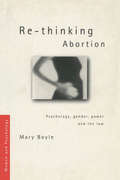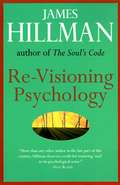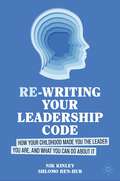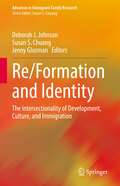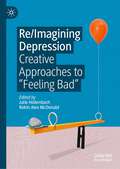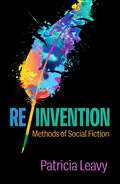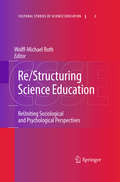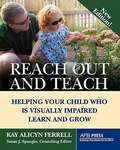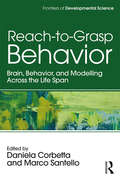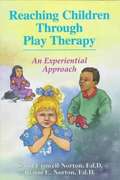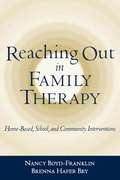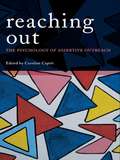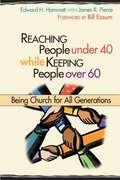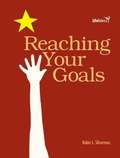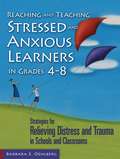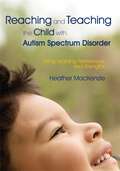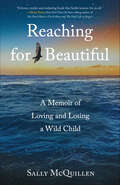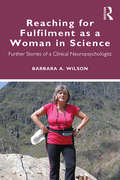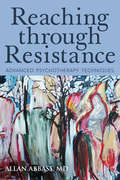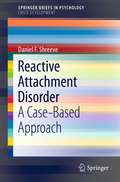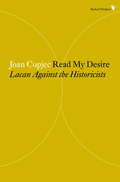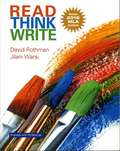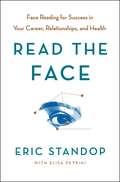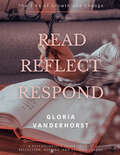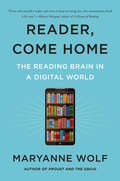- Table View
- List View
Re-thinking Abortion: Psychology, Gender and the Law (Women and Psychology)
by Mary BoyleWomen have been able to have abortions legally for over 30 years. Yet few books have considered it as anything other than a health issue. Mary Boyle breaks this mould by considering the constructions of abortion in Western society. Drawing on ideas from sociology, politics, anthropology and law as well as psychology, she shows how abortion is linked to sexual behaviour and motherhood in the complex web of gender and power relations.This book will be of interest to all those engaged with feminist thinking, whether as student, academic, or professional in practice.
Re-visioning Psychology
by James HillmanThis groundbreaking classic explores the necessity of connections between our life and soul and developing the main lines of the soul-making process.
Re-writing your Leadership Code: How your Childhood Made You the Leader You Are, and What You Can Do About It
by Shlomo Ben-Hur Nik KinleyWhere do your instincts come from and how can you improve them? Stretched by heavy workloads and facing ever more complex environments, leaders increasingly find themselves running on automatic and relying on their instincts. But depending on instincts is a bit like gambling, and as a result, stress levels, mistakes and failure rates are all on the up. In this ground-breaking book, leadership experts Nik Kinley and Shlomo Ben-Hur reveal how our instincts are the products of childhood experience - lessons learnt that have become written into the structure of our brains. Like the source code at the centre of a computer, they underpin almost every aspect of our functioning as leaders. They affect how we interpret and experience things, how we react to events, the environments we choose, the impact we have on people, and even the responses we trigger in others. Often these instincts and tendencies are hidden beneath professional poise. But under pressure, when we are deprived of time, they come to the fore. This is why leading under pressure can bring out the best and the worst in us. And it is why – ultimately – leadership is a test of the character of our instinctual code. Based on decades of research, this book shows how we get to be the leaders we are today. It explains the tendencies and inclinations that past experiences can leave us with and the hidden ways in which they can affect who we are as leaders and how we behave. And crucially, it shows how we can make better use of our instincts and even improve them to become better leaders.
Re/Formation and Identity: The Intersectionality of Development, Culture, and Immigration (Advances in Immigrant Family Research)
by Susan S. Chuang Deborah J. Johnson Jenny GlozmanThis innovative book applies contemporary and emergent theories of identity formation to timely questions of identity re/formation and development in immigrant families across diverse ethnicities and age groups. Researchers from across the globe examine the ways in which immigrants from Africa, Asia, Europe, and Latin America dynamically adjust, adapt, and resist aspects of their identities in their host countries as a form of resilience. The book provides a multidisciplinary approach to studying the multidimensional complexities of identity development and immigration and offers critical insights on the experiences of immigrant families. Key areas of coverage include: Factors that affect identity formation, readjustment, and maintenance, including individual differences and social environments. Influences of intersecting immigrant ecologies such as family, community, and complex multidimensions of culture on identity development. Current identity theories and their effectiveness at addressing issues of ethnicity, culture, and immigration. Research challenges to studying various forms of identity. Re/Formation and Identity: The Intersectionality of Development, Culture, and Immigration is an essential resource for researchers, professors, and graduate students as well as clinicians, professionals, and policymakers in the fields of developmental, social, and cross-cultural psychology, parenting and family studies, social work, and all interrelated disciplines.
Re/Imagining Depression: Creative Approaches to “Feeling Bad”
by Julie Hollenbach Robin Alex McDonaldWhat is depression? An “imagined sun, bright and black at the same time?” A “noonday demon?” In literature, poetry, comics, visual art, and film, we witness new conceptualizations of depression come into being. Unburdened by diagnostic criteria and pharmaceutical politics, these media employ imagery, narrative, symbolism, and metaphor to forge imaginative, exploratory, and innovative representations of a range of experiences that might get called “depression.” Texts such as Julia Kristeva’s Black Sun: Depression and Melancholia (1989), Andrew Solomon’s The Noonday Demon (2000), Allie Brosh’s cartoons, “Adventures in Depression” (2011) and “Depression Part Two” (2013), and Lars von Trier’s film Melancholia (2011) each offer portraits of depression that deviate from, or altogether reject, the dominant language of depression that has been articulated by and within psychiatry. Most recently, Ann Cvetkovich’s Depression: A Public Feeling (2012) has answered the author’s own call for a multiplication of discourses on depression by positing crafting as one possible method of working through depression-as-“impasse.” Inspired by Cvetkovich’s efforts to re-shape the depressive experience itself and the critical ways in which we communicate this experience to others, Re/Imagining Depression: Creative Approaches to “Feeling Bad” harnesses critical theory, gender studies, critical race theory, affect theory, visual art, performance, film, television, poetry, literature, comics, and other media to generate new paradigms for thinking about the depressive experience. Through a combination of academic essays, prose, poetry, and interviews, this anthology aims to destabilize the idea of the mental health “expert” to instead demonstrate the diversity of affects, embodiments, rituals and behaviors that are often collapsed under the singular rubric of “depression.”
Re/Invention: Methods of Social Fiction (Qualitative Methods "How-To" Guides)
by Patricia LeavyFrom Patricia Leavy, a leader in arts-based research, this is the first comprehensive guide to what social fiction is and how to write it. In an engaging, personal tone, Leavy explores the unique contribution that creative writing--such as novels, series, and short stories--can make to addressing qualitative research questions. In-depth discussions of narrative models (such as the three-act structure) and elements (such as plot, metaphor, dialogue) are accompanied by excerpts from Leavy's published fiction, reflections on the writing process, and technical suggestions. The book offers evaluation criteria for social fiction as well as practical publishing advice. Instructive features include "tip bubbles" with additional writing hints, end-of-chapter "Skill-Building" and "Rethink Your Research" exercises, and an appendix with suggested readings.
Re/Structuring Science Education
by Wolff-Michael RothSince its beginnings, science education has been under the influence of psychological theories of knowing and learning, while in more recent years, social constructivist and sociological frameworks have also begun to emerge. With little work being done on showing how the perspectives of these separate approaches might be integrated, this work aims to plug the gap. The book helps lay the groundwork for reuniting sociological and psychological perspectives on the knowing, learning, and teaching of science. Featuring a range of integrative efforts beginning with simple conversation, the chapters here include not only articles but also commentaries that engage with other papers, as well as a useful running narrative that, from the introduction to the epilogue, contextualizes the book and its sections. Specific attention is given to cultural-historical activity theory, which already offers an integration of psychological and cultural-historical (sociological) perspectives on collectively motivated human activities. A number of chapters, as well as the contextualizing narrative, explicitly use this theory as a framework for rethinking science education to achieve the reunification that is the goal of this work. All the contributors to this volume have produced texts that contribute to the effort of overcoming the extant divide between sociological and psychological approaches to science education research and practice. From very different positions--gender, culture, race--they provide valuable insights to reuniting approaches in both theory and method in the field. As an ensemble, the contributions constitute a rich menu of ideas from which new forms of science education can emerge.
Reach Out and Teach
by Kay Alicyn FerrellPacked with important information for todays parents and professionals, this new edition of a groundbreaking work presents the latest research on how visually impaired children learn and develop at different ages and in the various developmental domains: sensory development, communication, movement, manipulation, and comprehension. Clear, practical, and reassuring, and full of suggested activities, this book provides a guide to teaching young visually impaired children the important life skills they need to know--skills that other children may learn simply by observation and imitation--and preparing them to enter school ready to learn with their peers. From early intervention services to the full range of educational placements, Reach Out and Teach is the ultimate guide to helping a visually impaired child learn and grow.
Reach-to-Grasp Behavior: Brain, Behavior, and Modelling Across the Life Span (Frontiers of Developmental Science)
by Daniela Corbetta Marco SantelloReaching for objects in our surroundings is an everyday activity that most humans perform seamlessly a hundred times a day. It is nonetheless a complex behavior that requires the perception of objects’ features, action selection, movement planning, multi-joint coordination, force regulation, and the integration of all of these properties during the actions themselves to meet the successful demands of extremely varied task goals. Even though reach-to-grasp behavior has been studied for decades, it has, in recent years, become a particularly growing area of multidisciplinary research because of its crucial role in activities of daily living and broad range of applications to other fields, including physical rehabilitation, prosthetics, and robotics. This volume brings together novel and exciting research that sheds light into the complex sensory-motor processes involved in the selection and production of reach-to-grasp behaviors. It also offers a unique life-span and multidisciplinary perspective on the development and multiple processes involved in the formation of reach-to-grasp. It covers recent and exciting discoveries from the fields of developmental psychology and learning sciences, neurophysiology and brain sciences, movement sciences, and the dynamic field of developmental robotics, which has become a very active applied field relying on biologically inspired models. This volume is a rich and valuable resource for students and professionals in all of these research fields, as well as cognitive sciences, rehabilitation, and other applied sciences.
Reaching Children Through Play Therapy: An Experiential Approach
by Carol Crowell Norton Byron E. NortonReaching Children Through Play Therapy provides essential instruction and guidance for beginning and experienced therapists. An in-depth exploration of the techniques of play therapy and an insightful discussion of the symbolic meaning and metaphor of play, this text is a must-have resource for therapists and parents alike.
Reaching Out in Family Therapy
by Nancy Boyd-Franklin Nancy Hafer BryThis volume provides the skills practitioners need to conduct family therapy sessions in the home, school, and community. The authors demonstrate how meetings outside of the traditional office setting can enable therapists to intervene actively in the various systems that affect clients' lives. This multisystems approach can be particularly useful when working with poor and ethnic minority families, whose support networks may include extended family, school personnel, and members of the "church family." Practitioners learn how to utilize out-of-office sessions to meet the people who are influential in clients' lives; observe the life realities of children, adolescents, and parents; and identify resources that can be mobilized to produce change. Detailed strategies are presented to help families navigate the overlapping demands of multiple agencies and institutions and to manage and prevent such problems as substance abuse, school drop-out, and child abuse. Throughout, therapeutic and ethical guidelines are illustrated by extensive clinical case material. The book is ideal for those already doing home-based work, as well as those who would like to incorporate it into their practice.
Reaching Out: The Psychology of Assertive Outreach
by Caroline CupittAssertive outreach is a means of helping people with serious and persistent mental health difficulties who have not engaged with conventional mental health services. Reaching Out examines the application of psychological approaches in assertive outreach – a process which involves forming new relationships and offering hope to people who have been alienated from traditional methods. Reaching Out begins with a discussion of topics including: engagement the team approach assessments team case formulation managing stress and burnout for staff. The second half of the book focuses on the task of delivering psychological therapies and considers a range of models including psychodynamic therapy, family therapy, cognitive behaviour therapy and community approaches. Reaching Out: The Psychology of Assertive Outreach demonstrates that the relationship between staff and service users is essential to the process of recovery and personal growth. The approach will apply not only to assertive outreach teams, but also to clinical psychologists, counsellors and other mental health professionals who are interested in psychological approaches to outreach work.
Reaching People under 40 while Keeping People over 60: Being Church for All Generations
by Edward H. Hammett James R. PierceMany church leaders are asking how to keep people over sixty years of age, who often hold church culture values, while at the same time reach people under forty, who often hold postmodern values. Does satisfying the needs of one group necessarily create a barrier to working with the other? Reaching People under 40 while Keeping People over 60 looks at the church as it seeks to function in a postmodern world, a global change that encompasses more than generational differences.
Reaching Your Goals
by Robin Landew SilvermanWe often hear about the accomplishments of famous people, but what about our own hopes and dreams? You know -- the kind you want so badly that you can almost see, hear, smell, and even taste them. Reaching Your Goals can help you transform wishes into goals one step at a time. Learn how to take action to get what you want by using the power of your imagination and creating some well-laid plans. Then -- because even the best-laid plans go awry -- find out how to stay on track and see them through, turning your dreams into reality. Book jacket.
Reaching and Teaching Stressed and Anxious Learner: Strategies for Relieving Distress and Trauma in Schools and Classrooms
by Barbara OehlbergThis important new resource helps educators understand how trauma and stress interfere with cognitive skills, and how classroom and school activities can be used to restore feelings of safety, empowerment, and well-being.
Reaching and Teaching the Child with Autism Spectrum Disorder: Using Learning Preferences and Strengths
by Heather MackenzieReaching and Teaching Children with Autism provides a positive approach to understanding and educating children on the autism spectrum. The book gives greater insight into the perspective and behavior of a child with autism and explores how the child's learning preferences, strengths and interests can be used to facilitate learning and enhance motivation. Based on well-researched theory and extensive clinical experience, the author provides a comprehensive model for developing lifelong independent learning skills in children with autism between the ages of 3 and 12 years old. The book describes the underlying principles, learning preferences and strengths typical of children with autism and offers a detailed but flexible program structure based on these concepts. Easy to follow activities and approaches are described in each chapter, along with clear examples and illustrations. This accessible and practical book is an essential resource for parents, teachers, support workers, therapists and others concerned with learning and development in children with autism.
Reaching for Beautiful: A Memoir of Loving and Losing a Wild Child
by Sally McQuillenFor fans of Joan Didion’s The Year of Magical Thinking or David Sheff’s Beautiful Boy, this debut memoir about a mother grieving her young-adult son’s death is a must-read for any parent who has lost a child or whose child struggles with addiction. When Sally learns that her twenty-one-year-old son Christopher died tragically in a boat accident, her greatest fear is realized. Christopher was often drawn to risk and struggled with addiction, and in this riveting memoir, Sally captures the wild ride of his jam-packed life and her deep love for him while also reflecting on her own childhood and family legacy of alcoholism. This book is for any parent raising a child from the edge of their seat, or for those suffering the trauma of losing a child. Sally shares insights about what it’s like to experience the emotional aftershocks of acute grief, and readers may see themselves in Sally’s bittersweet illusion of trying to keep Christopher safe; in how she is challenged to let go of her fear, guilt, and regret in order to forgive herself; and in the ways grief teaches her about the power of love. Reaching for Beautiful is a luminous story of how love triumphs over pain, love transcends fear, and love never dies.
Reaching for Fulfilment as a Woman in Science: Further Stories of a Clinical Neuropsychologist
by Barbara A. WilsonThis vivid memoir presents adventures from the life of Barbara A. Wilson, an internationally honoured scientist who played an influential role in the development of neuropsychological rehabilitation at a time when the scientific field was dominated by men. As a follow-up to the highly successful Story of a Clinical Neuropsychologist, this book includes a host of memories, both personal and professional, which focus on Barbara’s development of her career as a woman in science. From childhood recollections and travels in Africa, to lifetime achievement awards and the restrictions of global pandemics, Barbara tells the story of her full and varied life and her unparalleled career in neuropsychological rehabilitation. Her book indicates that one can lead a meaningful and full life even after one of the most awful of losses, the death of a child, and also emphasizes the need to stick to one’s principles in trying times. The result is an unparalleled insight into the life of a clinical neuropsychologist, which can encourage the next generation of professionals who are trying to balance career, international travel and family, as well as inspire any girls interested in entering the world of science.
Reaching through Resistance: Advanced Psychotherapy Techniques
by Allan AbbassA New Metapsychology of the Unconscious Helps Patients Succeed in PsychotherapyAbout half of all psychotherapy clients do not respond--or even worsen--in treatment. Why? They unknowingly use treatment-defeating behaviors, or resistances, that prevent successful collaboration with the therapist. It's as if they cannot allow treatment to succeed. This can be frustrating and demoralizing for both the therapist and the client. How can you and your client detect and handle treatment resistance? How can you reach through to the person beneath this resistance--the person your client was meant to be?For treatment to succeed, you need to recognize and challenge treatment resistance from the first session. Reaching through Resistance will help you * turn a client against his or her own long-held defeating behaviors * regulate intense anxiety when strong feelings are activated * activate and process previously avoided impulses and feelingsUsing the interventions in this book for handling resistances, you can empower a collaborative, vigorous treatment alliance and mobilize the healing forces within your client."Numerous clinical vignettes show how to put theory into practice, leading to enduring change...If you want to know how to help clients change, this book is essential reading."--David Malan, DM, FRCPsych, noted researcher and author"Abbass demonstrates how one can reach behind the resistances of even the most repressed and fragile character types and offer them genuine, lasting change...a gold mine of clinical insight."--Stanley B. Messer, PhD, Dean and Distinguished Professor, Graduate School of Applied and Professional Psychology, Rutgers UniversityAllan Abbass, MD, is a professor of psychiatry and psychology at Dalhousie University in Halifax, Canada. He is a highly sought-after consultant, speaker, and clinical supervisor in North America and Europe.
Reactive Attachment Disorder
by Daniel F. ShreeveA child's close bond with mother, father, or guardian usually provides a foundation for trust in all future attachments. Children deprived of early and healthy dependency--who do not form normal attachment with their caregivers--may later suffer from Reactive Attachment Disorder (RAD). This childhood disorder is characterized by a general failure in social relationships resulting from pathogenic care. Although first included in the third edition of the Diagnostic and Statistical Manual (DSM-III) in 1980, RAD is one of the more uncommon and understudied forms of psychopathology. Reactive Attachment Disorder: A Case-Based Approach adds to a now growing research base, providing scholars and clinicians with a well-rounded analysis of RAD and suggested treatments. The case-based approach used in this Brief follows the representative case of "Jorge," presented as unfolding over time and structured to illustrate challenges of diagnosis, to show examples of co-morbidity, and to provoke reflection on what questions may arise during treatment. Readers are asked to appraise the overlap with other clinical syndromes, the forms of psychotherapy which may apply, and the potential role of psychiatric medications as part of a comprehensive treatment plan.
Read My Desire
by Joan CopjecIn Read My Desire, Joan Copjec stages a confrontation between the theories of Jacques Lacan and Michel Foucault, protagonists of two powerful modern discourses - psychoanalysis and historicism. Ordinarily, these discourses only cross paths long enough for historicists to charge psychoanalysis with an indifference to history, but here psychoanalysis, via Lacan, goes on the offensive. Refusing to cede historicity to the historicists, Copjec makes a case for the superiority of Lacan's explanation of historical process, its generative principles, and its complex functionings. Her goal is to inspire a new kind of cultural critique, one that would be "literate in desire," that would be able to read what is inarticulable in cultural statements.From the Trade Paperback edition.
Read Think Write: True Integration Through Academic Content, (8th Edition: MLA Update)
by David Rothman Jilani WarsiRead Think Write: True Integration Through Academic Content helps students develop the skills they need to achieve success in all subsequent academic courses. <P><P> The authors start with an introduction to the reading, thinking, and writing processes and a detailed discussion of how students can get the most out of the text. Subsequent chapters are organized thematically, each covering an academic content area. This provides students with an immersive learning experience by building their academic vocabulary and enabling them to develop and pursue academic interests. <P><P> Each discipline chapter culminates with an essay assignment that asks students to integrate skills they've learned in the chapter and ideas from the other chapter readings. Students apply these skills by reading actively, thinking about and evaluating text, identifying the topics, main ideas, and details, making inferences, and recognizing key patterns of organization and translating these reading skills into their writing equivalents to write thoughtful, effective essays. <P><P> * The 8th Edition introduces sweeping changes to the philosophy and details of MLA works cited entries. Responding to the "increasing mobility of texts," MLA now encourages writers to focus on the process of crafting the citation, beginning with the same questions for any source. These changes, then, align with current best practices in the teaching of writing which privilege inquiry and critical thinking over rote recall and rule-following.
Read the Face: Face Reading for Success in Your Career, Relationships, and Health
by Elisa Petrini Eric StandopRelearn the intuitive language of face reading From birth, face is our first language. We are born face readers—knowing to seek out human features and faces from the moment our eyes open. We all have the intuitive ability to read and interpret the feelings and expressions of those around us. In Read the Face, master face reader Eric Standop unlocks the power of this innate human ability, sharing his own journey to become a face reading master, along with stories that illustrate the power of this unique language. Using a combination of three different schools of face reading, along with a scientific accuracy to detect the most fleeting microexpressions, Standop is able to read personality, character, emotions, and even the state of a person’s health—all from simply glancing at their face. The book is divided into sections focusing on specific ways that face reading can offer insight, such as Health, Love, Communication, Work and Success. The stories are accompanied by detailed black and white illustrations of faces, allowing readers to observe the same features that Standop interpreted. The final section of the book outlines the meanings of dozens of facial features and face shapes, so that readers can recognize their own innate intuitive powers and develop them. Read the Face is a guide to using the ancient art and science of face reading to go beyond the surface and create the boldest life possible.
Read, Reflect, Respond: The 3 Rs of Growth and Change
by Gloria VanderhorstEXPLORE THE WOUNDED PARTS OF SELF WHICH CREATE UNHEALTHY ATTACHMENTS TO SELF AND OTHERS Many of us walk around desperately trying to fill the empty void within us with anything that on the surface looks promising. We hook into relationships, jobs, friendships, substances, and adrenaline; letting these things define our reality instead of taking the initiative to define our own. These patterns are born from a wounded part of ourselves from long ago. We spend most of our time trying to address wounded needs rather than our actual ones. This journal is designed to help keep the reader focused on their actual needs while identifying the wounded ones which tend to drive us on a daily basis. The creation for the original version of this working journal was inspired from Dale Ryder's work with families suffering with addiction and traumas. The core message of the journal is similar to her previous journal but has changed and morphed after her experience of great loss and great love over the past 10 years. It is also a companion book to the spiritual journey she wrote titled Surviving Irene: Releasing the Need for the Wounded Child." These two creations have been a labor of love demonstrating Dale's personal growth, as she has helped others navigate theirs.
Reader, Come Home: The Fate of the Reading Brain in a Digital World
by Maryanne WolfFrom the author of Proust and the Squid, a lively, ambitious, and deeply informative epistolary book that considers the future of the reading brain and our capacity for critical thinking, empathy, and reflection as we become increasingly dependent on digital technologies. <P><P>A decade ago, Maryanne Wolf’s Proust and the Squid revealed what we know about how the brain learns to read and how reading changes the way we think and feel. Since then, the ways we process written language have changed dramatically with many concerned about both their own changes and that of children. New research on the reading brain chronicles these changes in the brains of children and adults as they learn to read while immersed in a digitally dominated medium. <P><P>Drawing deeply on this research, this book comprises a series of letters Wolf writes to us—her beloved readers—to describe her concerns and her hopes about what is happening to the reading brain as it unavoidably changes to adapt to digital mediums. Wolf raises difficult questions, including: <P><P>Will children learn to incorporate the full range of "deep reading" processes that are at the core of the expert reading brain? <P><P>Will the mix of a seemingly infinite set of distractions for children’s attention and their quick access to immediate, voluminous information alter their ability to think for themselves? <P><P>With information at their fingertips, will the next generation learn to build their own storehouse of knowledge, which could impede the ability to make analogies and draw inferences from what they know? <P><P>Will all these influences, in turn, change the formation in children and the use in adults of "slower" cognitive processes like critical thinking, personal reflection, imagination, and empathy that comprise deep reading and that influence both how we think and how we live our lives? <P><P>Will the chain of digital influences ultimately influence the use of the critical analytical and empathic capacities necessary for a democratic society? <P><P>How can we preserve deep reading processes in future iterations of the reading brain?Who are the "good readers" of every epoch? <P><P>Concerns about attention span, critical reasoning, and over-reliance on technology are never just about children—Wolf herself has found that, though she is a reading expert, her ability to read deeply has been impacted as she has become, inevitably, increasingly dependent on screens. <P><P>Wolf draws on neuroscience, literature, education, technology, and philosophy and blends historical, literary, and scientific facts with down-to-earth examples and warm anecdotes to illuminate complex ideas that culminate in a proposal for a biliterate reading brain. Provocative and intriguing, Reader, Come Home is a roadmap that provides a cautionary but hopeful perspective on the impact of technology on our brains and our most essential intellectual capacities—and what this could mean for our future.
